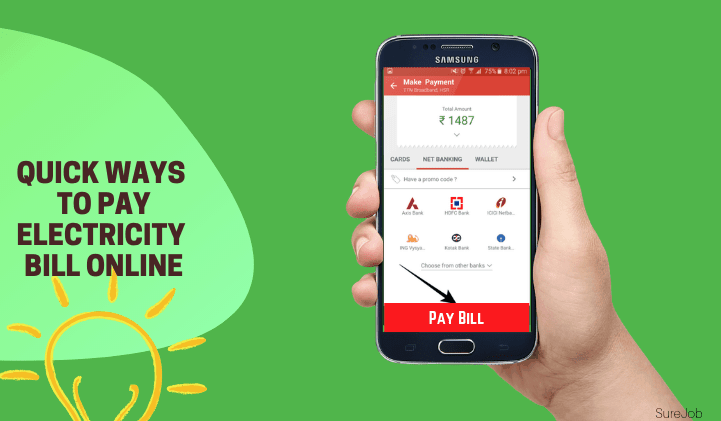The average cost of electricity supplied to households in India in 2018 is pegged at Rs.5 for one kilo Watt hour (kWh). The rate can differ according to your location and utilities provider.
Indian households electricity bill payment ranging from Rs.500 to whopping Rs.25,000 per month.
Of course, this depends upon various factors including the size of the house, number of air conditioners, other home appliances and electronics used by the household, among others.
Though your electricity bill is lower, there are ample opportunities to slash it further. But before we proceed, it is vital to understand some basics about electricity billing system in India.
Calculating Electricity Consumption
All utilities providers in India- whether state run or private companies- calculate your electricity consumption on the basis of kilo Watt hours (kWh). One unit of electricity is therefore 1kWh.
Putting it simply, a 100Watt electricity bulb consumes 1 kwH electricity if left on for one hour.
Generally, all utilities providers in India will charge a discounted rate- between Rs.2 and Rs.4 per kWh for the first 100 units- or 100kWh.
- They will charge around Rs.5/ unit if you consume more than 100 units up to 300 units.
- If your home or office uses between 301 units to 500 or 300kWh to 500kWh of electricity, the rate is exponentially higher- about Rs.9 per unit for the additional consumption.
- In case you use more than 500 kWh, these will be calculated at a rate of around Rs.11 per unit.
This means, you will be charged according to slabs. One rate will be applied for consumption up to 300 units, another for 301 to 500 units and the third for using more than 500 units of electricity.
Considering these rates, it is vital to save electricity and keep your household expenses in check.
There are several ways and means to reduce your electricity costs by taking some simple steps. Interested? Here are ways and means for how to save electricity at homes and offices.
12 Efficient Ways to Save Electricity
Here we present some time tested and proven ways to save electricity and your money by lowering power bills.
1. Proper Use of Air Conditioners
Air conditioners rank among the largest guzzlers of electricity. Rapid deforestation leading to climate change and concrete jungles peculiar to cities necessitate use of air conditioners.
Unfortunately, most Indians are unaware about proper use of air conditioners. They blame utilities providers for charging high.
Proper use of air conditioner involves setting the right temperature and mode. There are different modes on an air conditioner such as chill, humid, rainy and sunny among others.
Select the right one. Setting temperature below 22 degrees Celsius causes more power consumption.
Also ensure that filters of your air conditioner, air inlets and outlets are clean.
Switch off an air conditioner as soon as your room has cooled to the desired temperature. Leaving it running only adds to your electricity bills. Also ensure all air conditioners are switched off when you leave the room, home or office.
2. Use Daylight
Millions of Indian households use electric lamps even during broad daylight. Some leave electric lights on even when they are not needed during the day.
Instead, use daylight and natural light. Switch off those electric bulbs, including the latest ‘Power Saving’ ones.
Florescent tubes, power saving lamps and their likes also consume lots of electricity. They need lesser power than ordinary bulbs. Yet, leaving them on or using despite ample daylight is a waste of energy.
You can save electricity by simply utilizing natural light at home and office.
3. Water Heaters
Water heaters need a lot of electricity. Heating coils fitted inside are designed to warm up water quickly so you can have instant hot water. You can save electricity through prudent use of water heaters.
The first step is to switch off water heaters when not required. As I mentioned earlier, they are equipped with high power coils so you can switch it on just before a bath, shower, shave or washing: you can get warm water within a couple of minutes.
While shaving, bathing or showering, turn off warm water taps while using a razor, soaping or shampooing. This has a double advantage: you save electricity while saving on the water bill too.
4. Washing Machine
Ensure you have full load of clothes before using a washing machine. Daily laundry is fine since it is essential part of personal hygiene. But by running a washing machine daily or with less loads, you are wasting loads of electricity.
It is possible to save electricity by scheduling your laundry and doing so only when there are adequate clothes to merit its use.
Should you require warm water for laundry, use the water heater only till the desired temperature of water in the washer tub is reached.
Switch off the water heater immediately because leaving it on consumes more power.
Set correct washing time and mode to save electricity. Setting the washer to a wrong mode inadvertently causes electricity wastage. The same holds true for dryers, if using a semi-automatic machine.
If you live in areas where weather is warm, you can use a dryer only to drain excess water from washed clothes and ensure they do not drip. The rest will dry off naturally due to hot weather.
5. Refrigerator
A refrigerator is ubiquitous to most Indian households. Modern day refrigerators are like energy conservation types. However, their power economy depends upon your usage. Set the thermostat according to loads inside your fridge.
If the quantity of foodstuff stored in your refrigerator is lower, change settings immediately to low. This allows you to save electricity.
Generally, user manuals of every refrigerator will indicate proper thermostat settings to get maximum efficiency for power. Study the user guide carefully.
Never put warm food in your refrigerator. A fridge will consume more power to cool it since warm food will release heat. This is particularly true if you are storing homemade sweets and desserts and need to cool it to solidify and set.
Storing warm food reduces the efficiency of your fridge after some time and cause irreparable damage to this expensive home appliance.
While no-frost or zero-frost refrigerators are common nowadays, you need to switch off this home appliance at least twice a month to ensure its efficient running.
Ceaseless running of compressors and cooling systems of your fridge will cause them to become less efficient over a period of time. Hence, they end up consuming more electricity.
Once in a while, rid your fridge of leftover foodstuff and switch it off for a few hours. Allow interiors to attain room temperature. Clean your fridge and switch on again.
Make sure you also clean the thermostat or sensor. Exert extra caution while wiping the delicate and fragile thermostat or sensor: any damage can cause your fridge to lose its efficiency and consume more electricity.
If you have a second fridge, switch off immediately unless the expense is fully justified.
6. Unplug Your Electronics
TVs, Set Top Boxes (STBs) provided by Direct-To-Home satellite TV providers and cable operators, laptops, PCs, music players and other electronics use small amounts of power when they are in standby mode.
Instead, unplug these appliances or turn the switch off instead of leaving them on standby mode to save electricity. The small amounts of power only add to your electricity bill.
Another major culprit is home WiFi routers. Unless someone will remain online round the clock, you need not keep the router on. It consumes a considerable amount of power. You can simply turn on Wifi when needed.
Generally, people connect their smartphone to WiFi at homes. This is unnecessary if you have a prepaid or post-paid mobile connection that also includes data.
7. Reduce Computer Usage
Unless absolutely necessary, avoid using a PC or laptop at home. Despite being energy Conservation, computers consume lots of electricity.
There are lots of tasks including accessing the social media or reading email that can be done through a smartphone. You can easily save electricity by reducing or eliminating the use of PC and laptop at home.
Computer games and their controllers are a major drain of electricity. While I do not deny your right to enjoy a computer game, it is wise to indulge in them prudently.
8. Television
Next on our list to save electricity is the TV. If you have one of these old TV sets that need high volumes of electricity, trade-off for a newer, power Conservation model.
Admittedly, going for a newer TV would cost some money. But over a few months, you will have recovered the full amount paid for the new TV by saving on electricity bills.
Switching between channels frequently uses more electricity. Hence, select the channel you wish to watch beforehand and change only when needed.
Never leave a TV set on while you are busy in another room. This is wanton wastage of electricity. If you have to leave the room for a longer period, switch off the TV and unplug it too.
9. Ceiling, Table & Stand Fans
Yet one more common mistake committed by many Indian households is leaving fans on while nobody is in a room. Remember, fans run on electricity powered motors. Hence, a fan left on without apparent reason is a waste of electricity.
You can save electricity simply by switching them off while leaving the room or going outside the house.
Also, select the right settings for your fan. Using it at high speeds for a good, breezy ambience comes at a cost in the form of high volumes of electricity. Drying clothes using a ceiling fan or table fan is a very bad idea.
You incur a lot of costs on electricity: clothes do not dry well, even when left under a running fan. Instead, dry clothes on a line or outdoors.
10. Microwave Oven
Indian homes generally use a microwave oven to warm leftovers or food that has gone cold. Microwaves use unimaginable volumes of electricity. Unless you need a microwave for cooking, is use is best avoided.
There are several energy Conservation and economical ways to warm leftovers and food that needs some heating. Use your gas stove instead.
If you are inclined towards using an electric home appliance, buy a toaster over since it consumes much lesser quantities of electricity.
11. Electric Mosquito Repellents
Most Indian would be acquainted with that catchy TV ad and its jingle: “Sweet dreams and…..” The ad is for a popular brand of electric mosquito repellent. Such devices of various brands are common to lots of Indian households.
But instead of “Sweet Dreams,” these electric mosquito repellents can give dreadful nightmares when it comes to your electricity bills.
Innumerable households in India fail to switch off these electric mosquito repellents that dispense a potent insecticide every morning.
Consequently, the small device continues to run throughout the day without serving any purpose, adding kWh to your electricity bill. The amount of energy wasted depends upon how many electric mosquito repellents you have at home.
Admittedly, they use little power to heat the liquid insecticide and spread it across a room. Yet, they do consume electricity. Save electricity by switching off these devices as soon as you wake up.
Another way to save power on electric mosquito repellents is by using nets on windows. This minimizes entry of mosquitos into your home.
Use such repellents only after dark. Switching off electric mosquito repellents on time and their proper use has one more advantage: you save money on refills of liquid insecticide and prevent the device from potential damage caused by overuse.
12. Electric Lighting
Nobody likes a dark, gloomy house. Hence, we switch on electric lights around dusk. It is a common and acceptable practice. You can save electricity and money with judicious use of electric lighting.
Switch off lights in rooms including kitchen and toilets when not in use. You may be using energy saver lamps but they still consume power and do not absolve you from paying electric bills for wasted electricity.
While choosing power saver bulbs, make sure the wattage and size are adequate for the room: using small ones means poor lighting and waste of electricity, larger ones means glaring light and consumption of precious power and higher bills.
Opt for power saver bulbs made by reputed brands only. Using fluorescent tubes often works cheaper and provides better lighting sometimes when compared over energy saver bulbs and lamps.
Other Ways to Save Electricity
Should you take a careful inventory of the home or office, it is possible to identify where it is possible to save electricity.
Power banks left to recharge, laptops and printers left on standby mode, mobile powers connected to chargers despite full battery, use of improper utensils while using induction stove and night lamps left on after daybreak are some indicators.
It is advisable to get your home and office wiring checked at least once a year, especially after monsoons. Faulty wiring leads to power loss. As the metal in wires gets old, its capacity to conduct electricity diminishes gradually.
Hence, it is better to change the wiring after a few years. This can help save electricity as well as lives. Faulty wiring can cause short circuits and result in electrical shocks.
Electric stoves need high kWh of electricity and hence are best shunned. Though energy Conservation modern makes of electric stoves are available, they offer limited power savings.
Instead, use induction stoves with proper vessels. As I mentioned earlier, cooking in utensils not meant for an induction stove causes severe energy wastage.
People of various religions also use various types of electric lights at a small temple or altar at home. You can save some electricity by using high-quality energy Conservation and decorative lamps that are easily available in the market at very affordable prices.
Use these decorative lamps to give that special look to your place of worship instead of using a conventional bulb and save electricity.
Night Lamps: Use or Not?
Use night lamps at home only if there is a genuine need. They consume electricity and often have an adverse effect on your vision.
Your eyes need to develop visual adaptation- the ability to adapt to various degrees of light and dark and yet see clearly.
Night lamps do not allow your eyes to adapt to darkness in a room. Hence, you deprive the brain and eyes of developing visual adaptation. However, it is your choice to whether or not to use night lamps at home.
Wrap Up
Saving electricity is a simple task if you simply follow the steps mentioned above. It needs the cooperation of your household to save electricity at home and staff to cut power bills at the office.
The Central Electricity Authority (CEC) forecasts that India will rank among nations that generate surplus power during the financial year 2018-2019.
However, this does not mean your utilities provider will necessarily lower tariffs.
Instead, rising petroleum costs due to US Dollar-Indian Rupee exchange rate volatility may force electricity companies to increase prices. Given such scenarios, it is imperative you save electricity at home and workplace.









